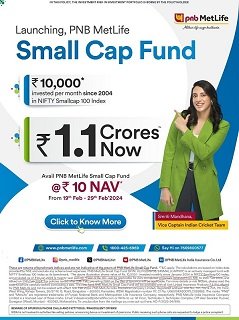
Mis-selling has been the bane of life insurance sector. Instead of protection cover, the emphasis has always been more on investment returns while promoting life cover products. In the past year, insurance companies and agents have started talking about terms associated with mutual funds while launching ULIPS – net asset value, index funds, etc. ULIPs are being promoted as pure investment products.
For e.g., one look at the advertisement image below and the first thing that strikes you is the product is a small cap fund. The ad talks about returns of the Nifty Small Cap 100 index and how Rs.10,000 invested in 2004 has grown to over Rs.1 crore now (highlighted in big bold font). It also suggests one can infer availing the fund at cheap price of Rs.10 during the NFO period.

Influenced by such return-oriented ads, investors end up in a quandary and may not be sure of what they end up buying – ULIP or mutual fund. The structure of ULIPs is vastly different from a mutual fund in terms of – commissions, withdrawal conditions, lock-in periods, investing styles and regulations.
IRDAI has hence finally cracked the whip on insurance companies to curb the rampant mis-selling. As per the master circular by the insurance regulator, Unit-linked and/or Index linked products shall not be advertised as ‘Investment products.’ They will be advertised only with reference to the underlying life insurance coverage.
In this regard, all the advertisements of linked insurance products and annuity products shall disclose the risk-factors along with the following warning statements:
- Linked insurance products/annuity products are different form the traditional insurance products & are subject to risk factors.
- The premium paid in linked insurance policies or the annuity offered is subject to market risks. The annuity amount or the NAVs of the units may go up or down based on the performance of the fund and the markets.
- The name of the life insurer and the product name does not in any way indicate the quality of the contract, its future prospects or returns.
- The insured should know the associated risks and applicable charges from the insurance agent or policy document issued by the insurer.
Every insurer and distribution channel is required to adhere to the above advertisement code. Hope this is followed by the insurers & agents in letter and spirit. Investors should also conduct their own due-diligence and ask the right questions before buying such products.
